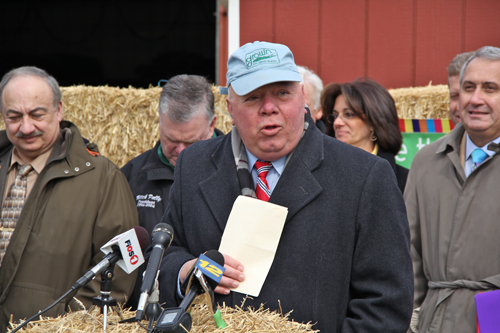L.I. Farm Bureau executive director stepping down after 26 years

The longtime executive director of the Long Island Farm Bureau has announced he’s retiring from his post after 26 years.
Joe Gergela, who was born in Greenport, grew up farming in Jamesport with his grandfather, mother and father — eventually helping to expand the family’s 35-acre growing operation.
By the 1970s, what was known as Gergela Farms grew to more than a 200 acre operation, with the family growing everything from strawberries and potatoes, to corn and cauliflower.
The 58-year-old said he has warm memories of picking strawberries with siblings on the family farm before school, from when he was as young as 6. He later decided to put his sophomore year of college on hold to help his father on the farm.
But the year of 1982 started a repetition of tough growing seasons, bringing with them minimal financial returns. What seemed like a perpetual loss of harvest forced the family out of the growing business in 1988, Mr. Gergela said — teaching him first-hand just how hard it is for farmers to stay in business.
That same year, Mr. Gergela said he was chosen to become executive director of the bureau — bringing with him his first-hand farming experience and knowledge public policy he gained by working part-time for the U.S. Department of Agriculture.
Since then, Mr. Gergela said he has fought to help farmers across the island, many of which he grew up with, carry on a centuries-old way of life.
At the same time, he has dealt with a more personal struggle, living and working with Type 1 diabetes, which he was diagnosed with at age 7.
He said he is retiring to spend more time focusing on his health.
Q: How did you first become a member of the bureau?
A: In 1982 I got involved with its young farmer program, and became the Long Island representative for the state and was sent to work on the national young farmer committee.
When my predecessor was retiring, members said ‘You should throw your hat in the ring.’ I thought about it and said, ‘I’m involved, and I like the way they do things, the way they operate’… In May, it will be 26 years since I first started.
Q: What would you say is your greatest accomplishment over your career?
A: I helped with the preservation of the KeySpan property in Jamesport. We struck a deal on how to preserve that property, and I’m the one that structured that deal.
I also wrote the definition of temporary greenhouses for the New York State Fire and Building code and another bill [involved with] making horse boarding considered agriculture.
I have done a lot of different things. The most important thing that my organization has accomplished is we’re proud that we still have working old time farms on Long Island. The Wickham’s, the Wells, the Halsey’s — they started farming on Long Island hundreds of years ago, and they are carrying on the tradition.
Q: Why have you stayed so dedicated to the position?
A: I think the number one reason is I really love to farm. My father and I enjoyed farming. The harvest, to see the rewards of your effort, it’s a thrill and an adrenaline rush. It’s hard to explain to other people why farmers do what they do.
Q: What would you say to those who criticize your outspoken style?
A: Some people may say my style is bombastic because I can blow a fuse, but anyone that knows me knows that I am passionate. I store it, and I keep it in until the cork pops the bottle. It’s probably not the best style but, hey; I’m a farm boy. I care about the people I represent. They are my friends. They are people I grew up with and that I respect. I’m rough around the edges — but I did it my way and I did it as straight forward as I can.
Q: Why have you chosen to retire now?
A: It’s mostly because of health issues. It’s hard for me and, plus, like any job, it has its stress. Representing an industry that has such stakes on the issues, with that comes its challenges.
We’re involved with a lot of different policy issues that are high stakes stuff, the water [quality] issue for example. It’s a double-edged sword issue for us because the public reacts to what they see or hear without taking the time to understand the science behind the issues. We all live here. The farmers have a huge interest in it in the same way [the public does].
Q: What advice would you give to your successor?
A: The person who is going to replace me is going to need the skills to always keep the organization non-partisan, but always be able to work with difficult people and understand the system. Whoever it is has to be a people person.
Q: What’s next for you?
A: I want to get in better shape health wise. Walking has become a challenge. Like walking the halls in Albany. I also want to try and eat better.
I have a new grandchild, Grayson, who is part of the reason my wife and I want to move [to Florida.] My plan is to be down there for the Christmas holiday.








